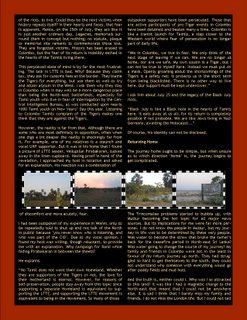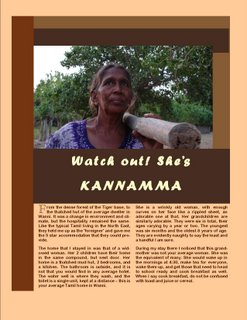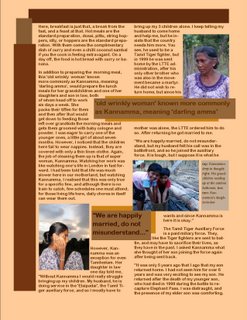



Keep posted for the next blog in a few days...
I do not know where to begin. Staring into the distance, I am registering little. My thoughts are a complicated minestrone, a masala mix. I do not know which thought leads to which, which emotion leads to the next. Caught in between two worlds, trying to make sense of one.
I began my journey to my motherland in early July. Traveling to the capital of Sri Lanka, Colombo, was a part of this journey because I needed to renew my passport visa. A citizen of one country, seeking the right to live in my motherland, asking permission from the very Sri Lankan government that controversially claims to represent the Tamil people. Fascinating how such an entity could be the cause of so much hardship, pain and yet hope. Motherland. What in the world is that? A piece of land, territory or more? It is simple to say that I am on a journey to my motherland, but its implications are myriad. If I had come a year or two ago, maybe my understanding of it would have been different. Standing here on the North East edge of this island, I know that history is being made around me. Am I a part of the audience, or an active participant? I do not know. So many questions that swarm my mind. Answers that I am yet to discover. I am like Marco Polo, exploring and discovering so much. However, unlike Marco, I am comforted with the knowledge that my exploration is justified, not colonial.
That knowledge itself offers a political explanation to one of my many questions. I have come to understand the struggle that surrounds me. In the process of understanding the struggle, I am discovering part of this exploration includes you all out there. Unable to comprehend why, but I have a sense of community, not only with my Tamil brethren here but all those that share their thoughts with me, traveling through my own journey since for many reasons you are unable to explore it for yourself.
Reflections...
July 25th 2006, Colombo.
Staring through the motel window in Wellawatte, I am immersed in thought and analysis. Tamileelam is so close and yet so far away. So many Tamil homes, Tamil shops and eateries surround me, and yet there is something missing in the Tamils that occupy them. It was only 23 years ago that homes and shops such as these were set alight. Tamils were looted, killed, burnt alive; their lives destroyed. Studies say that over 3000 were killed in what even the British suggest was a orchestrated attack on the Tamils. What this event signified in the least was the absence of approval for Tamils to live there. The message was clear. And yet, still deaf to this message, thousands of Tamils have returned to the site of the riots, to live. Could they be the next victims when history repeats itself? In their hearts and faces, that fear is apparent. Hence, on the 25th of July, they act like it is just another ordinary day. Legacies, memorials surround them in concept but nothing; no statute, plaque or memorial site remains to commemorate those lost. They are forgotten victims. History has been erased in Colombo, but the fear of its return is indelibly etched in the hearts of the Tamils living there.
This perplexed state of mind is by far the most frustrating. The talk is LTTE is bad. Why? Because they claim tax, they ask for customs fees at the border. They blame the Tigers for everything, but use them as well to try and attain asylum in the West. I ask them why they stay in Colombo when it may well be a more dangerous place than being the North-east battlefields, especially for Tamil youth who live in fear of interrogation by the Central Intelligence Bureau, as was conducted upon nearly 1000 Tamil youth on New Years’ Day this year. Listening to Colombo Tamils complain of the Tigers makes one think that they are against the Tigers.
However, the reality is far from that. Although there are some who are most definitely in opposition, often when one digs a bit deeper the reality is shockingly far from it. For example, one of my relatives is a staunch and vocal UNP supporter. But it was in his home that I found a picture of LTTE leader, Vellupillai Pirabakaran, tucked away in the linen cupboard. Having proof in hand of the revelation, I approached my host in isolation and asked for an explanation. His reaction was a combination of discomfort and more acutely, fear.
I had been outspoken of my experience in Wanni, only to be repeatedly told to shut up and not talk of the North in public because ’you never know who is listening, and who was part of the CID’. Due to my vocal opinion, I found my host was willing, though reluctant, to provide me with an explanation. Why campaign for Ranil while hiding Pirabakaran in between the sheets?
He explains.
“No Tamil does not want their own Homeland. Whether they are supporters of the Tigers or not, the love for their motherland is eternal. However, for reasons of self-preservation, people stay away from this topic since supporting a separate Homeland is equivalent to supporting the LTTE, and supporting the LTTE movement is equivalent to being in the movement. So many of those outspoken supporters have been persecuted. Those that are active participants of pro-Tiger events in Colombo have been detained and beaten many a time. Colombo is like a transit launch for Tamils, a step closer to the Western world where fear of persecution is no longer part of daily life.
“We in Colombo, we live in fear. We only think of the next stage of leaving if we can. We are no longer at home, nor are we safe. My own cousin is a Tiger, but I can not be true to myself here. Instead we must put on a mask. Openly groaning about the shortcomings of the Tigers is a safety net; it protects us in the short term from being blacklisted. There is no other way to live here. Our support must be kept undercover.”
I ask him about July 25 and the legacy of the Black July riots.
“Black July is like a Black hole in the hearts of Tamils here. It eats away at us all, for its return is completely possible if not probable. We are like Jews living in Nazi Germany, awaiting the Holocaust...”
Of course, his identity can not be disclosed.
Returning Home
The journey home ought to be simple, but when unsure as to which direction ‘home’ is, the journey begins to be complicated.
The Trincomalee problems started to bubble up, with Muttur becoming the hot topic for all major news sources. But its implications for me were far more personal. I do not know the people in Muttur, but my journey in life was to be determined by these very people. Was water to become the straw that broke the camel’s back for the ceasefire period in North-east Sri Lanka? Was water going to change the course of my journey? My family and friends in Colombo were not in the least in favour of my return journey up north. They had struggled so hard to get themselves to the south, they could not understand why someone with everything would go after paddy fields and mud huts.
And the truth is, neither could I. Why was I so attracted to this land? It was like I had a magnetic charge to the North-east that meant that I could not be anywhere else. It is sad I think that I barely miss my family and friends. I do not miss the London life. But I could not tell you in words what it is that made me return Home, instead of trekking back to London. Thinking back, I know it was the right decision. Something is keeping me here. Maybe it is history in the making. Maybe it is the pace of life. The ability to enjoy the beauty of the land, and not feel guilty about wasting time.
But the reasons were not all positive, for it was also the feeling of guilt that kept me here. I had seen so much, seen how much help and social work that needed to be done in the North-east. I had made promises and if I was to leave just because of the threat of war, I would be just like the rest of them. The rest of the Tamil Diaspora, who came when the times were good, to enjoy the cheap but delicious ice cream and fruits of their Motherland, but only to go when the going got tough.
What about those who have nowhere to go? They will be the ones who will face the shellfire and aerial bombing attacks when the war begins. If I was to leave now, how would I be able to return when the times become good again? Leaving now would be a betrayal of my fellow brethren, a slap in the face of the upcoming onslaught of violence the war will bring. Having grown so close to so many of my brethren, I could not allow this, though I knew their hearts and minds were magnanimous enough to embrace me even after such a betrayal.
So I remained and watched the waters rise and cause the battle waves to crash...
Journeying Back Home...Through Alien Land
I take a step down from the rickety airplane onto the Palaly airstrip. In front of me is a vast expanse of asphalt plains. The sight reminds me of a barren dessert land, causing me to forget that where I stand is at the tip of the Tamil homeland, Palaly, Jaffna. There are no coconut palms to temper the tension I feel in the air. All those disembarking clutch onto their suitcases tightly, holding their heads low. It’s an extremely humorous sight — humorous except nauseating, to see middle-aged Tamil men, who fit the stereotype of being the Man of the Manor, hanging their heads low. The same men who are King of the Hill at home, now are submissive. I wonder if they learn a lesson from this, and realize how demeaning it is to be overpowered.
The luggage checking is a painstakingly arduous task. Each bag is checked at the pace at which the checkpoint staff wish. Most checking is based on personal discretion of the guards, young girls and boys being the most apparent targets. This meant that I too was one of those selected. The man in front of me came with six bags full of shopping from Colombo. He went through smoothly. I on the other hand, came with a laptop on one hand and an Adidas sports bag slung over the other. Unfortunately, I was pulled outside from the usual queue. There my interrogation began.
‘Where are you going? What for, in these times? Why did your parents leave you alone? Are you running away from home? Are you single? Do you have a boyfriend?’
And most amusingly,
‘Are you part of the LTTE?’
The last question seemed to be based purely on the fact that my hair was cropped. What was interesting however, was the nature of the interrogation. The power balance was obvious. There was no right to legal advice, nor right to silence. The questioning became so random, and in many instances, offensive and derogatory. I was close to talking back, but I sensed, showing my personal strength, was not only inadvisable, but inappropriate. This was most evidently a scare tactic of theirs, rather than a questioning in search of answers. Fear was the blatant weapon of psychological warfare here.
When I first started talking back, the old lady behind me pinched me on the hip and whispered,
‘Don’t talk back, it will not give you any results.’
She was right. Silence is not a right, but a form of enforced self-preservation here in the Jaffna peninsula. It’s also the cause of self-destruction. People do not walk the streets. Curfews come and go, but social gatherings are few and far between. A stark difference to Kilinochchi, which is buzzing until 9 pm every night.
Daily life here in Jaffna, the hometown of so many Tamils worldwide, is nearly depressing. Luxury is in copious quantity, but it is this very luxury that is slowly going to eat away at the people here. The source of this destruction is nothing but the idiot box.
SunTV satellites are present in most homes. Bunkers for safety from aerial bombings are fewer in number. Watching the Tamil folk as they sit in front of the television 24 hours a day, 7 days a week, watching Indian movies, teledramas and video clips, I doubt that they would even get up when the aerial bombings start firing down upon them.
Television seems to be the most potent drug that has been fed to the people in Jaffna. Apathy, indifference and absence of motivation is evidenced by the scarcity of entrepreneurship. While family members in Europe, Asia and other Western countries including the UK, work day and night to send finances by post to their loved ones living in their homeland, these very loved ones sit in front of the TV, and like couch potatoes, watch the money get sucked in by Indian cinema, commercialism and luxury goods. DVD sets have become an essential item in Jaffna, when even those who send the money fail to have one. However, I cannot be too critical of those living here. Scattered like wildflowers are Army checkpoints, stationed in front of homes, on street junctions and near schools. Although these guards are meant to be protecting the Tamils, the deep seated fear in the Jaffna townfolk suggests otherwise. As one middle-aged woman told me, ‘We haven’t forgotten everything, although we try. We know of Tharsini’s rape, and know that when the war begins again, these soldiers at the checkpoint won’t just tease the schoolgirls and smile at us like they do now. They will bring back their old ways. It has already started, little by little. But there is nothing we can do. Our homes are here. We have nothing if we move to Wanni. So until the war becomes full-scale, we will stay here.’
Apathy and fear is by far the worst concoction here in Jaffna. To escape reality, they engross themselves in television. Knowing all the while they are only waiting, waiting for the day when the war begins.
10th of August, 2006
I travelled through Muhamaalai, passed the checkpoints, and am glad to be out of the soul-crushing town which is my hometown. Jaffna is my parent’s birthplace, but to me, feels more alien than London. The whole place is full of zombies, waiting for the gates of heaven or hell to open. Stepping foot into Wanni is a relief. The air tells me I have come to the right place. HOwever, the air at Elephant Pass seems to sting. Times are bad here, and the wind feels it too.
As I pass through the town of Palai, it is deserted. I stop at a tea shop for my favourite snack: rolls and milk tea. There I overhear the conversation between the old man at the counter and one of his customers.
Signs suggest that the war is to begin. All the iNGOs are evacuating, taking with them their belongings. His next door neighbour has already left to stay with his relatives in Puthukudiyiruppu. He doesn’t know what to do, since all his relatives are in Jaffna.
He states, ‘If only those fools would listen to me and come to Wanni, we could all get a place inside and be relatively safe. Then the Tigers could easily capture the Peninsula for us, and then we can return home safely. Instead, I am unable to move because I cannot abandon my family. But at the same time I don’t even have contact with them since the phone lines are cut. I don’t know what to do...’
As I travelled down the A9 road, I wonder if the war is to begin. Who is going to die? I captured photos of the beautiful landscape. Who knows whether the next time I come, the tops of the coconut trees will be wiped away? Would the salty water, washing gently upon the shores, be crimson, soaked in blood? Would people I know die? Immediately my thoughts go to Arivalaki. Her long black locks, would they get caught in the barbed wire, or would she mistakenly place her foot on a landmine and maim herself, or worse die? My thoughts are overwhelming and my mind, about to explode. Where am I now? A few months ago, I was in London town, contemplating my journey. Now I am here. When I came I was highly sceptical of the Tigers. But now I am standing here, in faith that they will protect me and wondering if one of their cadres will get wounded or die.
I am no fan of complicated politics. I have made a conscious effort to stay away from it. All I know is that something in me says I belong here. This is my home. I miss my mother, father, friends and family. But I was never content with their company, whilst being caught in an alien land.
The wind blows through my hair and the sun sets behind the coconut trees lined along the horizon. I am here and something tells me I am not alone. I have things to do and places to see, and far to go before I sleep...
11th of August, 2006
The War Began.









